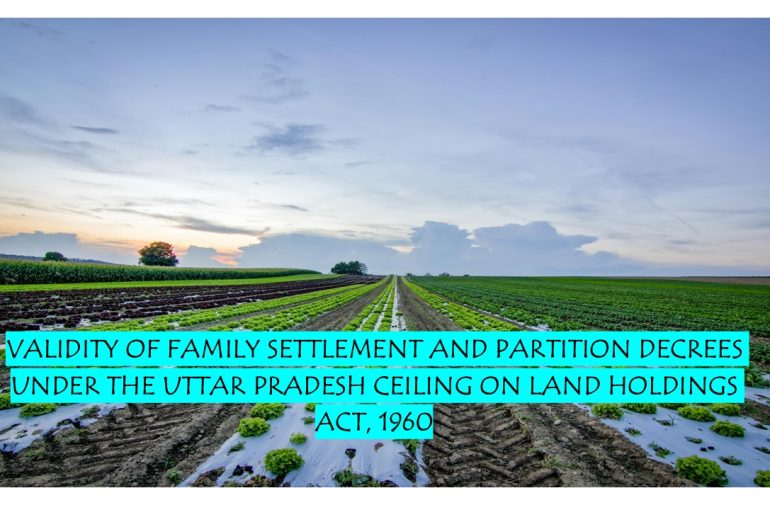VALIDITY OF FAMILY SETTLEMENT AND PARTITION DECREES UNDER THE UTTAR PRADESH CEILING ON LAND HOLDINGS ACT, 1960
The Judgment in the Case of State Of Uttar Pradesh &Anr. Versus Suresh Chandra Tewari & Ors. CIVIL APPEAL NO. OF 2024 (@ SPECIAL LEAVE PETITION (CIVIL) NO.20021 OF 2022) was delivered by a Division Bench of the Supreme Court of India, comprising Hon’ble Justice Sudhanshu Dhuliaand and Justice Ahsanuddin Amanullah, On 17 December 2024. In this Case, the Court dealt with the validity of a family settlement and partition decrees concerning the imposition of landholding ceilings under the Uttar Pradesh Imposition of Ceiling on Land Holdings Act, 1960.
FACTS
In this Case, The Uttar Pradesh Imposition of Ceiling on Land Holdings Act, 1960 (hereinafter referred to as the “Act of 1960”) was enacted to limit land holdings and redistribute surplus land to benefit landless individuals. Under the Act, any person holding land above a specified limit was required to declare the surplus, failing which the State could take possession of the excess land. In this case, Shri Hari Shankar Tiwari was recorded as the owner of certain agricultural lands in Uttar Pradesh. However, he did not submit the mandatory landholding statement under Section 9 of the Act, which led the authorities to issue a notice under Section 10(2) to determine the surplus land in his possession.
In response, Shri Tiwari argued that his lands had already been partitioned among his family members through a family settlement in 1967 and subsequent Civil Court decrees in 1970 and 1971. He claimed that the partition reduced his individual holding below the ceiling limit prescribed under the Act. However, his claims were rejected, holding that the family settlement and the court decrees were not valid under the Act. Consequently, it treated the lands as a single holding under Shri Tiwari and declared 37 Bigha 5 Biswa and 17.8 Biswansi of land as surplus, to be acquired by the State. Dissatisfied with this decision, Shri Tiwari appealed before the District Court
District Court
The Late Shri Hari Shankar Tiwari appealed before the District Court, Hardoi, who partly allowed the appeal, reducing the surplus land to 33 Bigha 8 Biswa and 14.8 Biswansi. However, the District Judge held that the partition decree dated August 9,1971 could not be considered due to Explanation I to Section 5(7) of the Act, as the partition suit was filed after the cut-off date of January 24, 1971.
High Court
A Writ Petition was filed before the High Court of Judicature at Allahabad against the District Judge’s order. The High Court dismissed the Petition and upheld the District Court decree, that the partition was invalid under the Act as it was instituted after the cut-off date.
Issues
1. Whether the partition based on the family settlement could be recognized under the Act of 1960.
2. Whether the provisions of the Act, particularly Section 5(7) and its explanation, could nullify the partition decree dated August 9,1971.
Contentions by the Appellants
The family settlement and partition decrees from 1967 to 1971 determined the shares of the family members, and the land should not be treated as a single tenure-holder’s holding.
Contentions by the Respondents
The partition decree was instituted after the cut-off date of January 24,1971 and, as per Section 5(7) of the Act, could not be considered valid for excluding land from being declared surplus.
Supreme Court
The Supreme Court reviewed the provisions of the Act, including the explanation under Section 5(7), which rendered the partition decree invalid as it was initiated after the statutory cut-off date. The Court upheld the decisions of the lower courts, concluding that the family settlement could not be relied upon and that the surplus land declaration was valid.
Conclusion
The Supreme Court reaffirmed that the provisions of the Act of 1960 took precedence over the family settlement and subsequent decrees. The family’s claim based on partition was rejected, and the surplus land declaration stood final. The case underscores the importance of statutory timelines and compliance with land reform laws.
Baddam Parichaya Reddy
Associate
The Indian Lawyer & Allied Services





































Leave a Reply